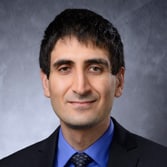Researcher Spotlight: Andrew Jallouk, MD, PhD
Vanderbilt University Medical Center
Errol M. Cook Memorial Scholar

Chimeric antigen receptor (CAR) T-cell therapy represents a highly effective treatment option for many types of lymphoma. Currently available CAR T-cell therapies are engineered on a patient-by-patient basis from an individual’s own blood cell, which represents a costly and time-consuming process. One way to overcome these barriers is through the use of allogeneic CAR T-cells engineered from the T cells of a healthy donor. However, use of this approach is currently hindered by the potential for the host immune system to recognize these allogeneic CAR T-cells as foreign, leading to immune-mediated destruction and limiting their efficacy and durability. “My project will study the mechanisms by which this immune rejection occurs and develop strategies to prevent it from happening,” Dr. Jallouk explains. “In so doing, my project will help to reduce cost and improve accessibility to life-saving CAR T-cell treatments for patients with lymphoma.”
Dr. Jallouk is currently an Assistant Professor of Medicine at Vanderbilt University Medical Center. “Throughout my training, I have been fascinated by the development and application of new technologies for the treatment of cancer,” says Dr. Jallouk. “As an engineer by training, I have been particularly interested in CAR T-cell therapies and the use of engineering principles to design and optimize these treatments.” After completing his undergraduate training in biomedical engineering and chemistry, earned a dual MD PhD from Washington University in St. Louis, MO. “As I gained more experience with lymphoma through my clinical rotations, I realized I was drawn not only to the cell therapy aspects of lymphoma management but to the disease process in general,” he says.
Building on his experiences in the Lymphoma Scientific Research Mentoring Program, Dr. Jallouk hopes to establish himself as an independent translational lymphoma researcher. In this role, he hopes to design and lead clinical trials on novel agents for the treatment of lymphoma, as well as conduct laboratory research to better understand the biology of these therapies. “With the recent development of so many new agents for treating lymphoma, there are more opportunities than ever before to ask interesting questions and conduct research that will improve the lives of patients with this disease,” he says.

